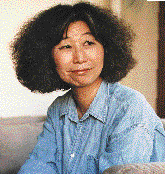WITNESS UNBOWED
Page 2 of 5
 hy am I writing about Korean comfort women?
hy am I writing about Korean comfort women?
I am a Korean American woman who came to the United States as a
graduate student. I was born in northern Korea while Japan ruled our
country, made us change our names to Japanese, speak their language, and
worship their emperor. In the spring of 1945, my chest bubbling with the
happy feelings of an enthusiastic first grader, I was playing a popular game
with five small stones, throwing them into the air and placing them in sets.
The animated chatter and laughter of girls, as I recall, spread through the
schoolyard like a symphony of spring.
| "It's bad enough that Japan committed such a horrendous crime against humanity but it is even worse to avoid responsibility for the wrong you committed." |
Living in America, I, like many others, decided to let my past be. The war and the colonial experience of both victims and victimizers has been largely repressed, buried with anger or sorrow. Most Americans of Asian roots whose ancestors experienced the horrendous atrocities committed by Japan do not know about that "uncomfortable past" and perhaps they don't care to learn. We were born in America, what do we have to do with that? Let's deal with the pressing issues here.
This is, however, one of the pressing issues of America and indeed of the world. The story of the Second World War is not just about problems between the European/American powers and Japan; it was not just a war between yellow and white. It was also yellow against yellow. It was about what Japan did to fellow Asians and others under the pretext of emancipating the Asian race from Western imperialism. This is a neglected story. Further, if America is truly a nation of immigrants from different roots, we Americans must attempt to understand each other's roots, each other's history.
The story of comfort women is a neglected aspect of war, of human rights violations, and of human brutality. Equally important, it is an ignored issue of gender. Further, it is a story of mostly Asian women from predominantly poor and uneducated families, a case of triple discrimination and neglect.
In August 1995, I went to the NGO Forum on Women in China held in conjunction with the Fourth World Conference on Women to help place the issue of Japanese military sexual slavery before the eyes of the world. On the fourth of September, I attended the International Symposium on Violence Against Women in War and Armed Conflicts and was honored to translate the testimony of a former comfort woman from South Korea, Chung Seo Woon.
 ABOUT THE AUTHOR
ABOUT THE AUTHOR
Dai Sil Kim-Gibson is an independent filmmaker and writer. In 1993 she directed Sa-i-ku: From Korean Women's Perspectives, a documentary video about Korean immigrant women and the 1992 Los Angeles Riots. Her latest project was a 60-minute documentary about the Coreans taken to Sakhalin by the Japanese as forced laborers during World War II and abandoned in the Soviet Union. Her forthcoming book is tentatively entitled Broken Memories of Comfort: Korean Comfort Women. That book is the basis of a documentary which Kim-Gibson is currently producing. Upon completion it will be broadcast nationally by PBS. Kim-Gibson was born in Korea. She lives and works in the Hudson Valley region of New York State. |
At age seventy-five, with lines of age on her face, she still exuded dignity and beauty. As she went to the podium, I disappeared into a translation booth.
"I was born an only daughter with no sons in a family of a well-to-do landowner in southern Korea," she started. Her voice flew out like a quiet stream. I listened to her every word and put them into English with my heart's devotion. "Half a century has passed since the time when every day was a dreadful nightmare for me, but Japan still tells lies and avoids responsibility. How can they do that in the presence of myself and many others like me, victims who are alive and kicking? The seed the Japanese planted, the evil seed, they must harvest no matter how dreadful if they wish to be part of the human race. Don't you believe so?" Loud applause. "Then they say, 'For all those poor Asians, we will raise private funds and help.' I have a message for you. I might be poor, but not that poor. I demand the compensation that is rightly due to me, even if I would burn the money after it's in my hand. It is not a matter of money but of principle. The Japanese defiled my body but not my spirit. My spirit is strong, rich, and proud." With the thunderous applause, I took off my headphones and stepped out of the booth. She stood by the podium with her head lifted high in front of the people who honored her with a standing ovation. With my arms around her, we came down together and sat in the front row of seats. PAGE 3
CONTACT US
|
ADVERTISING INFO
© 1996-2013 Asian Media Group Inc
No part of the contents of this site may be reproduced without prior written permission.
